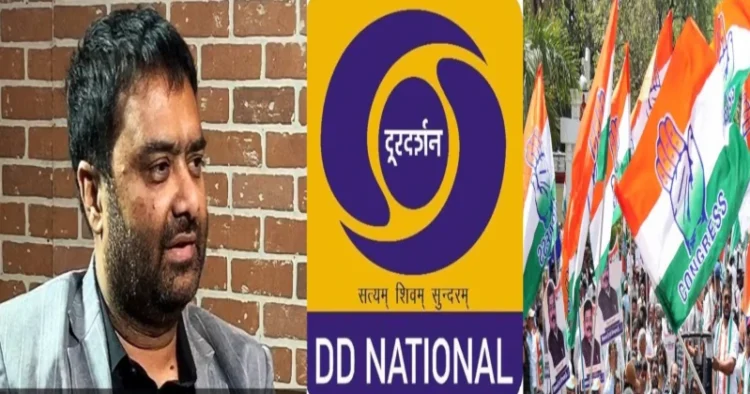In a recent revelation, journalist Deepak Chaurasia has opened up about being dismissed from Doordarshan (DD) in 2004, coinciding with the ascension of the Congress-led government under Sonia Gandhi and Rahul Gandhi’s leadership. Chaurasia, who identifies as an Other Backward Class (OBC) journalist, made this disclosure during a conversation with India TV, shedding light on the challenges faced by OBC journalists in the media landscape.
This revelation finds its roots in Chaurasia’s book titled #NarendraModiCensored by another senior Journalist Ashok Shrivastav, where he initially documented his dismissal from DD along with nearly 100 other journalists during the Congress regime’s tenure. The sudden termination of their employment at DD, as asserted by Chaurasia, raises questions about the party’s commitment to media freedom, especially given the recent uproar in the Congress manifesto regarding fostering a free press.
Reflecting on his experience, Chaurasia highlighted the irony of the situation, emphasising his OBC background and questioning the rationale behind his dismissal. He accused the Congress of displaying opportunistic behavior by now seeking OBC journalists while conveniently sidelining them in the past. According to Chaurasia, this shift in approach underscores the politics of votes, where parties prioritise their interests over genuine inclusivity.
आज दीपक चौरसिया ने यह सार्वजनिक रूप से स्वीकार किया कि 2004 में कांग्रेस की, सोनिया गांधी- राहुल गांधी की सरकार आते ही उन्हें डीडी से निकाल दिया गया था जबकि वो ओबीसी पत्रकार हैं।
इसका खुलासा मैंने अपनी पहली पुस्तक #NarendraModiCensored में किया था। अकेले दीपक चौरसिया नहीं करीब… pic.twitter.com/2aPcopYVgi— Ashok Shrivastav (@AshokShrivasta6) April 30, 2024
During his conversation with India TV, Chaurasia criticised the Congress party’s stance on reservation, labeling it as a facade. He pointed out the contradiction between their purported support for reservation policies and their past actions of removing OBC journalists like himself from prominent media platforms like DD.
Furthermore, Chaurasia’s comments shed light on the intricacies of caste politics within the Congress party. He accused Rahul Gandhi of engaging in tokenism by selectively seeking out OBC reporters, branding them as “fake reporters.” He also criticised senior Congress leader KC Venugopal for his purported lack of knowledge regarding the top OBC castes in Uttar Pradesh, questioning the party’s genuine understanding of OBC issues.
Earlier, the Congress-led Karnataka Government embroiled controversy for extending reservation benefits to all castes and communities within the Muslim population by categorising them under the Other Backward Classes (OBC) category. This move has sparked criticism, particularly from the National Commission of Backward Classes (NCBC), which argued that such blanket categorisation undermines principles of social justice.
Specifically, the government categorised 17 and 19 castes from the Muslim community into category 1 and 2A, respectively, under the OBC quota. Additionally, a new category, 2B, was created to encompass all remaining castes and sub-castes of the Muslim community. This decision has intensified the debate surrounding reservation policies and the perceived appeasement of certain communities, raising questions about equitable distribution and fairness in the allocation of quotas.



















Comments